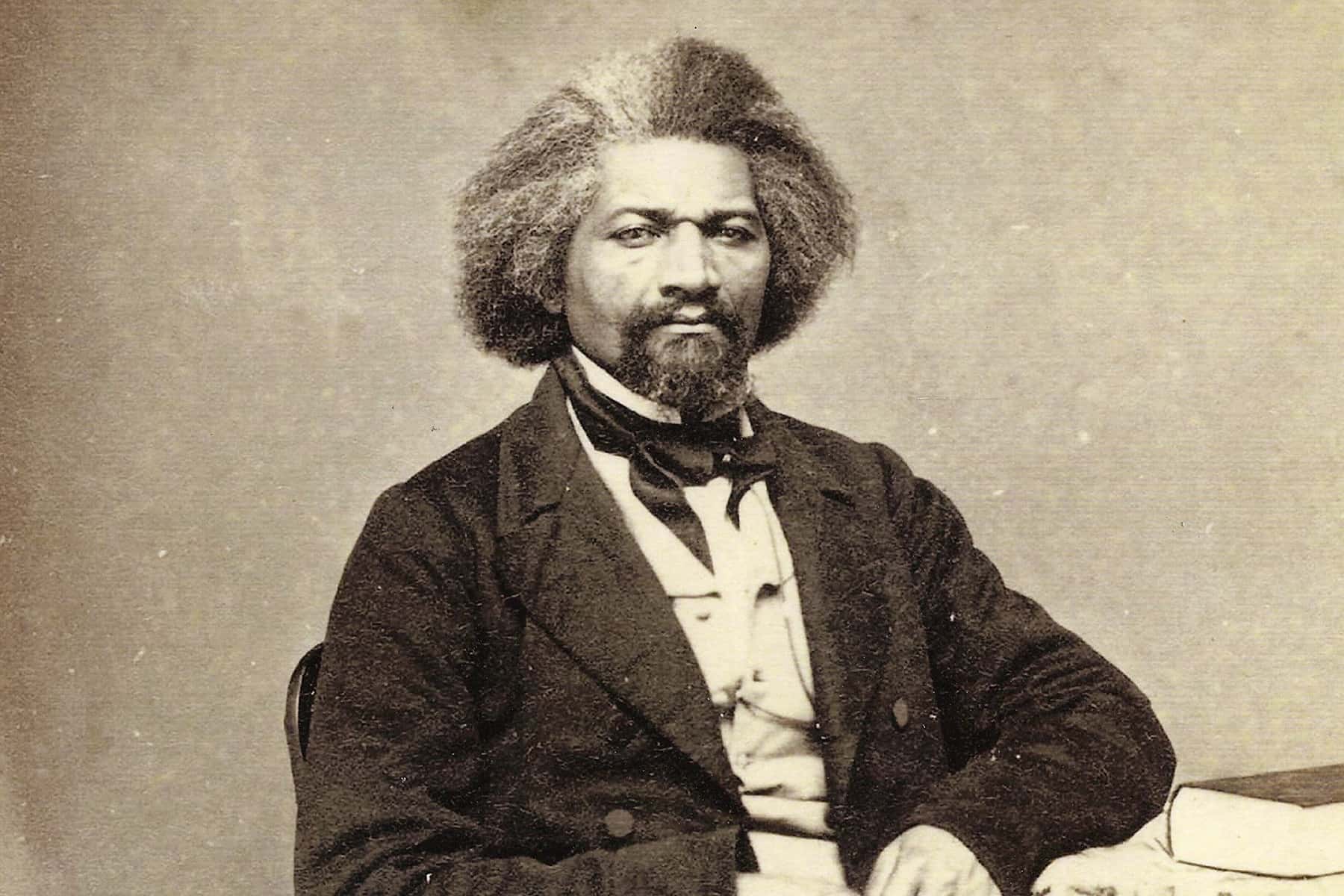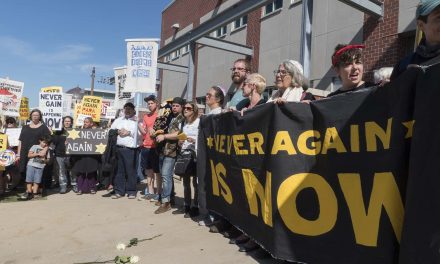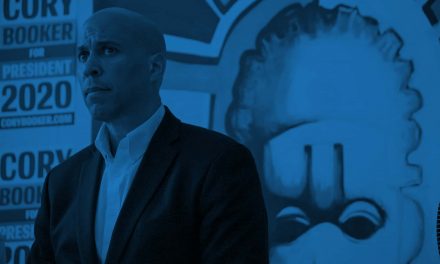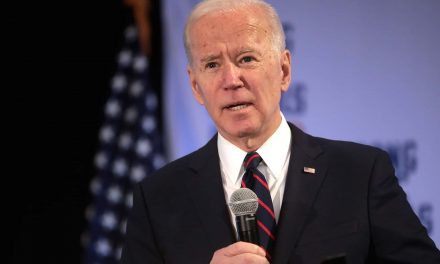
“Abraham Lincoln’s Emancipation Proclamation abolished slavery. The Civil War, for the most part, dismantled the treasonous Confederacy. Yet Frederick Douglass inherently understood it would take more than words and war to grant African-Americans public register of their humanity. He had seen enough caricatures of blacks, their faces nose-deep in watermelons, or dangled above lakes as alligator bait. He despised drawings portraying his people with exaggerated features, slack-jawed expressions, or as giddy slaves. Such images, Douglass knew, reinforced white supremacy by presenting black people as simple-minded and subjugated. Douglass soon embraced a technological weapon to challenge his nation’s racism: photography. Long recognized as a great orator, Douglass used pointed rhetoric to rebuke slavery and promote freedom for African-Americans. In posing for dozens of portraits, he showed what black freedom and dignity looked like. To Douglass, a picture wasn’t worth 1,000 words, its potential impact was immeasurable. His images still shape and affect policy and public perception. In his writings and speeches, Douglass forced the nation to reckon with its racism. Yet, it was in his photographic record that Douglass may have found his purest vessel of truth.” – Renee Graham
America will observe the 202nd birthday of the iconic abolitionist Frederick Douglass on February 14, 2020, even though the actual date of his birth remains unknown.
Frederick Douglass was born into slavery on the Eastern Shore of Maryland in 1818 and named Frederick Augustus Washington Bailey. He became one of the most famous black men in the nation during a life where he consistently fought for human rights. Hired out to work in Baltimore, he taught himself to read and write, and escaped slavery in 1838 at the age of 20, with the help of a free black woman who later became his wife.
Douglass died in Washington DC from an apparent heart attack on February 20, 1895. The following year, the Bethel Literary Society met on February 18 to celebrate his birthday. It was noted that Douglass had decided during his lifetime to use Valentine’s Day to make his birthday.
“After he got his freedom he celebrated St. Valentine’s Day as his birthday, since he felt he had a good a right to have a birthday as other people, and he liked the traditions surrounding that date.”
In subsequent years, local schools for African-American children started marking the observed birthday as “Douglass Day.”
As an orator, Douglass traveled around the country to speak about his experience as a slave. As the nation became embroiled in the Civil War, he advised President Abraham Lincoln on the fate of former slaves, and later met with President Andrew Johnson on the subject of black suffrage. Douglass kept up a rigorous speaking schedule, battling against the continued injustice and basic lack of freedom faced by many Americans.
“If there is no struggle there is no progress. … Power concedes nothing without a demand. It never did, and it never will,” Douglass once said.
Considering many Americans remain unaware of Frederick Douglass or were taught very little about him in school, here are a few surprising facts about the pioneering historical figure.
- One of the reasons we celebrate Black History Month in February is because of Frederick Douglass. Historian and educator Carter G. Woodson founded the precursor to Black History Month, “Negro History Week,” to coincide with the time of year when both Douglass and Abraham Lincoln celebrated their birthdays. Although Douglass was born into slavery and his actual birth date is unknown, he chose to commemorate his birthday on February 14.
- Douglass was the most photographed American of the 19th century, sitting for more portraits than even Abraham Lincoln. Douglass intentionally sought out the cameras, believing that photography was an important tool for achieving civil rights because it offered a way to portray African Americans fairly and accurately. He intentionally did not smile for the camera because he wanted to counter “happy slave” caricatures that were common at the time, particularly in places such as minstrel shows where white actors performed racist skits in blackface.
- Frederick Douglass chose his name from a poem. Douglass was born with the name Frederick Augustus Washington Bailey. After he successfully escaped slavery in 1838, he and his wife adopted the name Douglass from a narrative poem by Sir Walter Scott, “The Lady of the Lake,” at the suggestion of a friend.
- Douglass became a free man thanks to help from European allies. His first autobiography, “Narrative of the Life of Frederick Douglass, an American Slave,” was so popular after it was published in 1845, he feared the publicity could lead to his capture, and he chose to live in Ireland and Britain for two years. While abroad, he went on a speaking tour and his British supporters were so moved, they collected funds to purchase his freedom in 1846. His autobiographies remain some of the most important and widely read accounts of slavery today.
- Douglass was the only African American to attend the First Women’s Rights Convention held in Seneca Falls, New York, in 1848. Shortly after the convention, Douglass wrote in his influential weekly abolitionist newspaper, the North Star, “In respect to political rights, we hold woman to be justly entitled to all we claim for man.” In 1866, he cofounded the American Equal Rights Association with Lucretia Mott, Elizabeth Cady Stanton and other feminist leaders supporting suffrage for all people.
- During the Civil War, Douglass passionately helped enlist free black men to fight in the Union Army, convinced it would help African Americans win freedom, respect and full citizenship. He wrote persuasive articles in his weekly newspaper, and when President Lincoln issued the Emancipation Proclamation in 1863 allowing African Americans to serve, two of Douglass’ sons were among the first to enlist. Douglass also helped improve conditions for the soldiers, meeting with Lincoln on issues such as equal pay and merit-based promotions, which African American soldiers eventually received.
- Douglass was the first African American to receive a vote for president at a major political party convention. The vote came from the Kentucky delegation during the Republican National Convention of 1888.
- Douglass was also the first African American to receive a vice presidential nomination when Victoria Woodhull, the first woman to run for president, chose him as her running mate at the Equal Rights Party Convention in 1872, although he did not acknowledge the nomination or campaign for the office.
- Later in his life, Douglass did much of his writing and deep thinking in a one-room cabin that he referred to as his “Growlery.” This odd name for the building on Douglass’ Cedar Hill property in Washington, D.C., was likely a reference to “Bleak House” by Charles Dickens; in the book, the character John Jarndyce has a small library next to his bedroom where he goes when he needs a place of refuge. Today, the Park Service maintains a replica of the Growlery at the Frederick Douglass National Historic Site made with materials from the original stone structure.
- Many of Douglass’ possessions were lost in a devastating fire in 1877. Douglass was visiting Washington, D.C., in 1877 when his home in Rochester, New York, burned down in a suspected arson that destroyed most of his family’s possessions. He went on to purchase Cedar Hill, the property that would become his final home and the national park site in his name, and he lived in the nation’s capital from that point on instead of returning to New York. Hundreds of Douglass’ letters and the only known complete set of Douglass’ newspapers were lost in the 1877 fire, and no photographs of the Rochester home survive. All of the books, furniture and photographs that firefighters saved from the blaze were sent to Cedar Hill, however, and the Park Service continues to preserve surviving artifacts, from his collection of walking canes to the violin he taught his grandson to play. In 1927, the city of Rochester built a public library at the site of Douglass’ former home that was formally renamed the Frederick Douglass Community Library in 2016.
“What to the Slave is 4th of July?” by Frederick Douglass
Fellow-citizens, pardon me, allow me to ask, why am I called upon to speak here to-day? What have I, or those I represent, to do with your national independence? Are the great principles of political freedom and of natural justice, embodied in that Declaration of Independence, extended to us? And am I, therefore, called upon to bring our humble offering to the national altar, and to confess the benefits and express devout gratitude for the blessings resulting from your independence to us?
I am not included within the pale of this glorious anniversary! Your high independence only reveals the immeasurable distance between us. The blessings in which you this day rejoice are not enjoyed in common. The rich inheritance of justice, liberty, prosperity, and independence bequeathed by your fathers is shared by you, not by me. The sunlight that brought life and healing to you has brought stripes and death to me. This Fourth of July is yours, not mine. You may rejoice, I must mourn. To drag a man in fetters into the grand illuminated temple of liberty, and call upon him to join you in joyous anthems, were inhuman mockery and sacrilegious irony. Do you mean, citizens, to mock me, by asking me to speak today?
What, to the American slave, is your Fourth of July? I answer: a day that reveals to him, more than all other days of the year, the gross injustice and cruelty to which he is a constant victim. To him, your celebration is a sham; your boasted liberty, an unholy license; your national greatness, swelling vanity; your sounds of rejoicing are empty and heartless; your denunciation of tyrants, brass fronted impudence; your shouts of liberty and equality, hollow mockery; your prayers and hymns, your sermons and thanksgivings, with all your religious parade and solemnity, are, to Him, mere bombast, fraud, deception, impiety, and hypocrisy—a thin veil to cover up crimes that would disgrace a nation of savages. There is not a nation of the earth guilty of practices more shocking and bloody than are the people of these United States at this very hour.
At a time like this, scorching irony, not convincing argument, is needed. O! had I the ability, and could reach the nation’s ear, I would, to-day, pour forth a stream, a fiery stream of biting ridicule, blasting reproach, withering sarcasm, and stern rebuke. For it is not light that is needed, but fire; it is not the gentle shower, but thunder. We need the storm, the whirlwind, the earthquake. The feeling of the nation must be quickened; the conscience of the nation must be roused; the propriety of the nation must be startled; the hypocrisy of the nation must be exposed; and the crimes against God and man must be proclaimed and denounced.
Scоtt Bоmbоy and Jеnnіfеr Еrrіck
Library of Congress
Portions of this article were taken from The story behind the Frederick Douglass birthday celebration and 10 Facts You Might Not Know About Frederick Douglass, in Honor of His 200th Birthday














